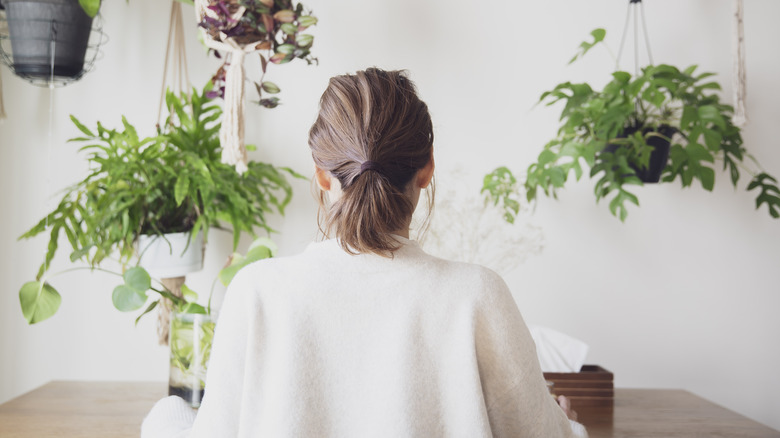New Year's Resolutions That Will Start 2023 Off Right
The ancient Babylonians are considered the first to institute the practice of making New Year's resolutions. While their new year actually began in mid-March, the general idea was more or less the same as New Year's resolutions of today — though it was more of a religious practice than a secular act. Whereas the Babylonians made promises to their gods in terms of how they would pay off what they owed or would ensure they gave things back to people they had borrowed from, these days, New Year's resolutions are kind of like promises we make ourselves to improve something about our lives.
A New Year's resolution could be about our internal or external lives. Some people use resolutions as a way to hold themselves accountable, and others make resolutions knowing full well they might not actually follow through. Setting a New Year's resolution or two can be deeply personal or something you share with others.
Not sure where to start? These resolutions are well worth setting — and sticking to — in the new year.
Find a better phone-life balance
In this day and age, a lot of us live and breathe by our smartphones. And while it's amazing to have a little computer inside your pocket at all times, we all risk being on our phones a little too much.
There have been many conversations about the importance of work-life balance — that is, making sure we are putting energy and effort into time that doesn't involve our jobs. It might benefit you to also consider your phone-life balance. According to a 2016 study, the average American checks their phone a whopping 46 times per day (via Harvard Business Review).
Our relationship with our phones can impact many parts of our lives. The Harvard Business Review notes that three of the biggest areas of concern are sleeping, eating, and moving. The solution to having a better phone-life balance might be as simple as choosing to leave your phone at home when you take a walk or head to the grocery store. No one is calling for a total ban on phones, of course, but taking a little bit of time throughout the day or week to be phone-free might do a world of good for us all.
Focus on a new hobby
For too long, New Year's Resolutions have placed a lot of emphasis on our bodies — losing weight, gaining weight, or changing our bodies in some way. In recent years, there has been a strong and steady push toward loving ourselves more. In that vein, consider focusing your resolution, time, and energy on how you can nurture a new hobby in your life instead of focusing on changes you want to see in your physical form.
Finding a new hobby may feel daunting at first, especially if you don't have a lot of free time in your life. Nevertheless, it's good to have a hobby that you genuinely do just for fun (read: not a side hustle) because hobbies can help lower stress, according to the University of California Merced.
Finding a new hobby may be as easy as turning something we already like to do into a regular practice (via The Muse). Look back at your childhood and remember what you used to find fun, or take a quiz to find out what you could be interested in now. Or, as The Muse suggests, you can try something brand new to see if it's something you want to keep doing.
Build strength in the gym instead of focusing on losing weight
If heading into the gym is a must for you in 2023, that's great — working out can be a wonderful practice! But this time around, consider focusing on gaining strength instead of losing weight. As author Danielle Friedman told The Cut while discussing her book, "Let's Get Physical," there's long been a belief that "the most important thing about a female body is not what it does but how it looks."
These days, women and men are changing their relationships with exercise. An abundance of at-home workout options has made it easier than ever for individuals to focus on themselves without having to worry about who else is paying attention, which Friedman says is a good thing. As she noted, one way to make our bodies stronger and to work out at home is by walking. Friedman explained, "People are reevaluating the culture of work and working all the time. They're acknowledging they're burned-out. I've been hearing more of an appreciation for more simple forms of movement like getting outside for a walk."
Friedman also revealed that she hopes the fitness industry begins to truly reflect the many ways fitness can be a good thing, not just weight loss. As she adds, "Then we can focus more on the benefits of our mental health, or a sense of social connection and overall well-being," she told The Cut.
Take one screen-free day a week
It's important to have a healthy phone-life balance every day of the week, but it can be beneficial to enjoy one full day each week without any screens. For many people who work with phones and computers, this might feel daunting; for people who enjoy unwinding at home with a TV show or movie, it might feel impossible. However, research indicates that one screen-free day per week or at least a solid chunk of screen-free time can be good for all of us.
In an essay for Wired, Tiffany Shlain shared that she and her family decided to go tech-free once a week on a day they refer to as their Technology Shabbat. Instead of using anything with a screen, Shlain and her family spent time with friends, read books, listened to music and, as she admitted, "And sometimes we just did nothing." They liked the practice so much that they were still doing it 10 years later.
In 2023, it could be worth having your own Technology Shabbat once a week, or a version of that which works for you. If a full day of no screens feels too challenging, start slow — an hour a day once a week. If you like it, you can gradually build toward a different goal.
Read more books
Reading is a hobby that is enjoyed by lots of people around the world, and plenty believe that the habit regularly improves their quality of life. As Parade pointed out, reading forces us to slow down and focus on just one thing at a time — the book right in front of our faces. Reading demands your total attention in a good way, offering your brain the chance to rest while simultaneously being engaged.
The outlet also pointed out two major reasons why reading can be rewarding. The first is that reading for fun takes more concentration than scanning a tweet or scrolling through photos on Instagram, which means you'll use your brain in a different way. The second reason that reading is rewarding is that it provides a way to destress. While coming home and turning on a movie or show might feel like a good way to unwind, nothing really matches the solitude and serenity that tucking into a good book can provide.
Declutter your home (and life)
Do you ever walk around your home and think that maybe, just maybe, you have too much stuff? Decluttering your home could be the ideal resolution for you in the new year. While some people might insist that they thrive in chaos, the Mayo Clinic posits that a lot of clutter around the home can actually make us all feel stressed out. Symptoms of stress include headaches, muscle pain, tension, fatigue, and an upset stomach. If you are experiencing these symptoms and also have a lot of clutter around, well, it might be worth spending some time reducing the number of things in your home to see if that calms your body and mind.
It's also worth considering if your life is cluttered with people, places, or things that are no longer serving you. Verywell Mind offers a lot of tips for managing and even potentially cutting out people who are sources of stress in your life. As the site noted, there is a difference between something or someone that is momentarily stressful and something or someone truly toxic.
Ask yourself, 'What if it all works out?'
A lot of us have the tendency to reach for the negative when confronted with a situation that we can't see a way around. Positive psychology expert Mark Hoelterhoff explained to PsychCentral that this negativity bias is hardwired into a lot of us through evolution. Many of our ancestors needed to have a heightened awareness about potentially dangerous situations and people, and the brain developed a way to hyper-focus to keep them safe. These days, many of us don't encounter these same situations, but our brains haven't caught up.
Luckily, you can change this. As Dr. Hoelterhoff said, "We can move beyond that negativity bias and begin to pay more attention to the positive aspects in our life." University of Pennsylvania's Martin Seligman agrees. As he told PsychCentral, one trick we can use to rewire our minds to think positively is to savor the genuinely positive experiences we have. According to Hoelterhoff, "It's that savoring approach that begins to create a new brain circuitry — a new neural network that's geared toward looking for the positive."
Instead of greeting a new and potentially stressful situation with negativity or assuming things will go badly, ask yourself this: What if it all works out the way you want it to? It might just play out perfectly, and your positive perspective can help you picture it in that way.
Drink more water
We know, we know — it can feel like we're constantly told to drink water. But there's a reason for this. Drinking water is really good for you. Hydration is hugely beneficial in a number of ways. Water is the most beneficial nutrient that humans can consume, and a lot of us simply aren't getting enough of it.
According to an October 2022 study published in StatPearls, chronic dehydration is especially prevalent in elderly populations, occurring in as many as 17 to 28% of elder adults. We tend to lose water in a few ways, including through the GI tract, skin, and lungs, but the study explained that preventing dehydration is easier than you might think.
The reasons some people don't drink a lot of water vary, but there are some ways that you can make drinking water more fun. Keep flavored water on hand or spritz some lemon or lime juice into a glass of water the next time you grab it from the sink.
Consider taking up journaling
Now that we have all collectively worked through a pandemic that displaced people from their homes, jobs, schools, and regular routines, it doesn't come as a huge surprise that many more people are working through anxiety and other mental health conditions. According to the Centers for Disease Control and Prevention, over a quarter of American adults have low anxiety, while 7.1% have medium anxiety, and 4.1% have high anxiety.
While some levels of anxiety require higher levels of intervention, there are a few things that most of us can do to battle low-level anxiety. One option is to take up journaling. The University of Rochester Medical Center suggests the practice of journaling as a way to manage overwhelming emotions, which means that the practice can help those of us who don't suffer from anxiety at all but who might find ourselves overwhelmed from time to time.
As the medical center reminded us, a lot of people had diaries when they were kids. Journaling as an adult provides the same outlet and the same benefits that having a diary provided back in the day, and there are plenty of cute journals out there to choose from if it's important to you to find something that is aesthetically pleasing.
Schedule annual health check-ups
It's not always fun or easy to go to the doctor, but scheduling (and actually going to) annual wellness visits is crucially important. There are many reasons that a lot of us give for not visiting the doctor once a year — we're busy, we have too much going on at work and at home, or maybe seeing the doctor makes us nervous. These are all understandable, but the fact of the matter is that attending an annual wellness visit can make all the difference in the world.
As the Mantachie Clinic in Mantachie, Mississippi, asserts, a check-up acts as an early detection screening that can help identify underlying conditions sooner than waiting until you experience symptoms. In a lot of cases, the earlier a medical condition is identified, the better.
The clinic also noted that going to your annual visit could help you feel less worried or scared about going to the doctor in general. For example, if you see your healthcare provider once a year under positive circumstances, you might feel more like you can open up to your doctor about what you are worried about. The clinic states, "Good relationships between patients and providers are beneficial for the patient's health."
Collect a few more house plants
There are plenty of people for whom buying new plants in 2023 is already a given, but there are actually health-related reasons why adding a few new plants to your home, office, or somewhere else where you spend a lot of time can be a great thing to do.
The University of Technology in Sydney conducted a study in 2010 and again in 2014 that examined the impact of indoor plants. The university found that there are a number of benefits to adding plants to one's workspace, including reducing air pollution and irritants, reducing workplace sickness, minimizing stress at work, improving job happiness, and more.
Ambius Indoor Plants, an interior landscaping company, also studied the benefits of indoor plants. The company claims that many people suffer from Sick Building Syndrome, and that 90% of people in Australia spend the majority of their time inside. However, many plants can thrive indoors right alongside humans and can improve the experiences we all have — whether we are at home or at work. In other words, consider this your permission slip to buy more plants in the new year.
Shop secondhand clothing instead of fast fashion
Many reports and documentaries have addressed the fast fashion crisis of recent years, and many people have started wondering what steps they can take to lessen the burden that trendy, cheaply manufactured clothing is having on the environment.
"The used clothing industry is more sustainable than fast fashion," Jackie King, the director of Secondary Materials and Recycled Textiles Association, told LeafScore, an organization that works to help people make choices that are more environmentally friendly. Of course, before we can make a resolution to buy less fast fashion and more upcycled, secondhand, or vintage clothing, it's helpful to understand just what fast fashion is. According to LeafScore, fast fashion is cheaply manufactured clothing.
Alternative options to fast fashion include secondhand brick-and-mortar shops, online websites such as eBay, and apps like Vinted. You can also purchase gently worn clothing on Facebook Marketplace and ThredUp.
Travel without a destination in mind
Plenty of us understand and believe that travel can be rewarding for the spirit and soothing for the soul. There is so much that can be learned through travel, such as how other people live and how we really fit onto a planet that is home to 8 billion people. But when a lot of us travel, we usually make our plans well in advance, buying airfare months before we go, booking car rentals weeks ahead of time, and so on.
What if, in 2023, you make the radical choice to travel without having any idea where you might end up? Of course, you'll need to have a starting point, especially if you are getting on a flight or renting a car, but what might happen if you don't have a hotel room booked and instead wait to see which direction you want to move in first? The answer could be very exciting.
As San Francisco psychologist Dr. Tamara McClintock Greenberg told Forbes, travel can play a major role in alleviating mental health weights. She explains, "The stress of work and daily demands can distract us from what we find to be actually meaningful and interesting." 2023 might be the year that we all get a little more adventurous, and this could be a great place to start.
Focus on being an authentic listener
You undoubtedly have people in your life that you care deeply about, and you surely want to be able to love and support those people in the ways they need you to — just like you hope those people will love and support you in return. Sometimes this can mean taking care of our loved ones in practical ways, such as giving someone a ride to or from work, preparing dinner before they get home, or taking care of them when they are sick. Other times, this can mean learning how to really listen.
Authentic listening is a skill all of us can hone. As Canada's Thrive Business Strategies pointed out, plenty of us spend time wondering how we fit into a situation. But instead of focusing on ourselves, try spending more time focusing on others.
As we head into the new year, perhaps what we need more than anything is to really see and hear one another. Learning to be an authentic listener can be the first step toward building closer relationships with everyone you love.














